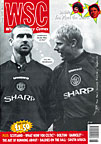 For good and bad reasons, football is becoming a bigger part of the political world
For good and bad reasons, football is becoming a bigger part of the political world
A week that began with the death of Lord Justice Taylor, ended with the demise of the Conservatives, whose assault on football was stopped in its tracks by the Taylor Report.
The Thatcher government’s proposed ID card scheme for football fans would have required anyone wishing to see a game to have such a card, without which it would have been an offence to enter a football ground. No more casual fans; no more birthday trips for kids without filling in forms in triplicate. This didn’t matter; football fans were a menace to society and had to be controlled. This from a government containing such familiar faces in the crowd these days as John Major, David Mellor and Kenneth Clarke.
The bill that could have killed football had already had a first reading in the House of Commons when Taylor’s verdict on the Hillsborough disaster appeared and recommended that the scheme be shelved, on the grounds that the ID cards would just have made the crush outside the ground worse, and its repetition more likely. While the report’s views on terracing remain controversial, Taylor expressed a view guaranteed to be unpopular with those who gave him the job.
Eight years on, with football now indelibly stamped with the core characteristics of Conservatism (stock market listings, an emphasis on individual greed, the widening gulf between rich and poor) it seems hard to imagine that the Tories once actively presented themselves as the anti-football party, secure in the knowledge that such a stance would pick up considerable support from the public.
The mood in Whitehall was echoed by a press, both tabloid and broadsheet, which rarely missed an opportunity to push the message about football stadia having become little more than a battleground for anti-social elements.
Today no politician, or newspaper, would dream of denigrating football for fear of losing votes, or readers. In at least one politician’s case, fear of damaging a post election media career ensured a pro-football stance. In the wake of losing his seat in Putney, David Mellor’s diatribe against the barracking he received from the Referendum Party included the comment that James Goldsmith “had behaved like a rugby fan”. A few years ago he would have said “soccer fan” on the assumption that his audience would have absorbed the message without complaint.
No doubt a fair proportion of the wavering voters in middle England courted by all the parties in the Election are among those who have discovered football in post Taylor Report times – and in some cases bought into it. Businessmen such as Alan Sugar, only too eager in the build up to the election to declare his support for New Labour now that it has shifted far enough to be acceptable to Rupert Murdoch, would not have cared a jot had football been ground into the dust in the 1980s by the Thatcher administration of which he was so fond.
Graham Kelly was effusive in his praise of Taylor – “The magnificent stadia which are springing up all the time will be his epitaph” – but didn’t dare mention one of the principal reasons why the FA had cause to be so grateful: if it doesn’t sound unseemly to use such a word in association with Hillsborough, the FA were enormously lucky, both to have wriggled out of any significant degree of culpability for the tragedy and to have since benefited hugely from the restructuring of football that followed on from the massive loss of life.
For years before Hillsborough the football authorities paid scant attention to supporters’ organisations’ warnings about the woeful safety standards at football stadia, and had not learned any lessons from a narrowly averted disaster at a previous cup semi final at Hillsborough. When Spurs played Wolves in 1981, fans arriving just before kick off after travelling up from London spilled out onto the pitch to avoid the crush building up in the overcrowded pens at the Leppings Lane End.
That event was commemorated by the Hillsborough Justice Campaign day of action on 3rd May. This joint initiative between the FSA and fanzines culminated in the crowd and players at the Liverpool v Spurs match at Anfield holding up cards and banners demanding a fresh inquest, in the light of the new evidence which prompted last year’s drama documentary. (Sky’s coverage of the match gave it scant attention, of course – much better to keep the audience’s mind firmly fixed on important stuff like percentage of possession and shots on target.)
Tony Blair has missed no opportunity to play the football card and unlike those who have occupied the government benches for the last 18 years, he didn’t play a part in the assault on the game. If the new administration wishes to send out a positive signal to those who supported both Labour and football during their wilderness years, it could do a lot worse than take note of what that crowd at Anfield on May 3rd were calling for and re-open the Hillsborough inquest.
From WSC 124 June 1997. What was happening this month